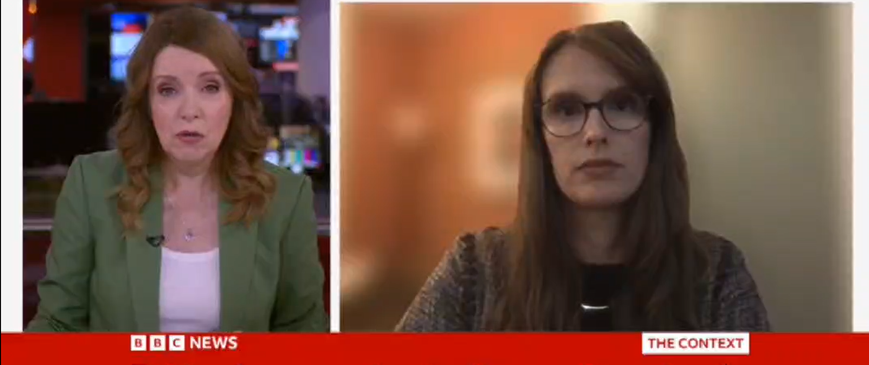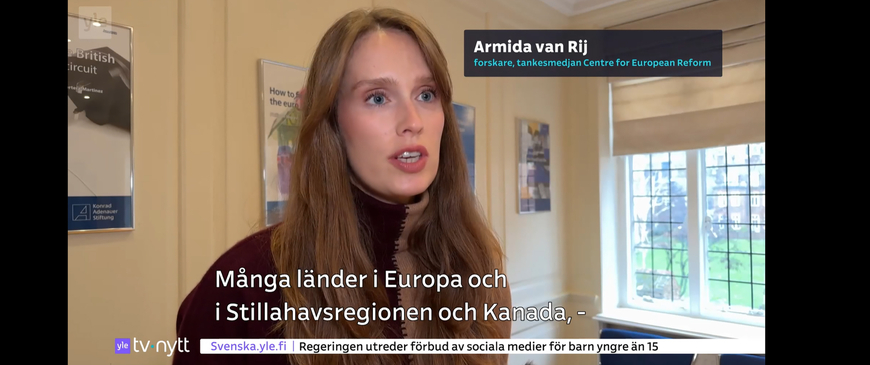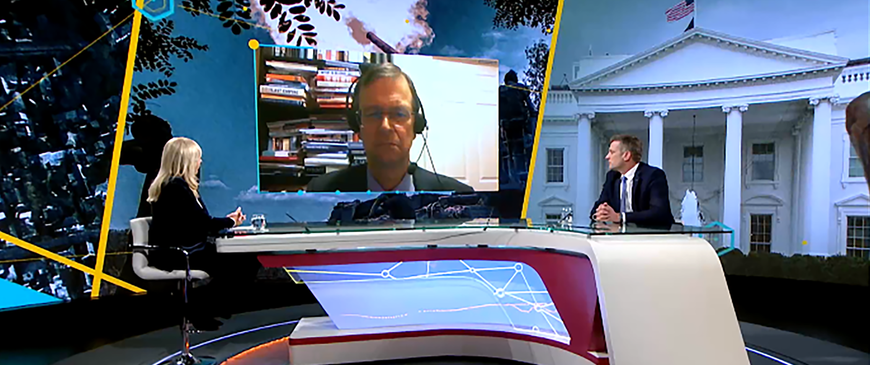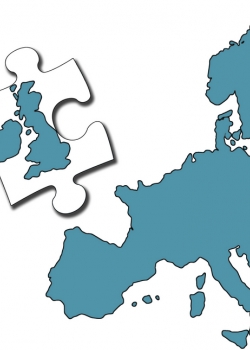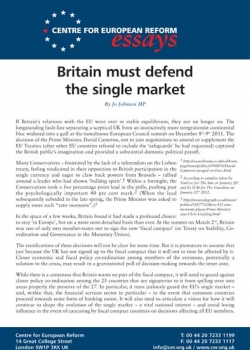Press
Hollande visit fraught with friction
09 July 2012
Financial Times
Charles Grant, director of the Centre for European Reform, said there was "a de facto dirty deal" between Britain and France, whereby London ultimately retained the rebate and French farmers continued to receive Brussels handouts. ..."What the Brits don't understand is they don't have any leverage," Mr Grant said.
Is Norway's EU example really an option for Britain?
07 July 2012
The Telegraph
Charles Grant, founder of the Centre for European Reform, said: "The City of London represents 75 per cent of Europe's financial markets, and it would be ridiculous to be sidelined like that."
Cyprus - buoyed by gas hopes
06 July 2012
EU Observer
For Europe as a whole, a Cypriot energy route would be a "plus," says Stephen Tindale from the CER. Particularly as it is "questionable" whether Europe's other planned pipeline, Nabucco, will get off the ground. "But given the inevitable involvement of Turkey and Israel, this will be even more complicated," says the analyst.
Vote to impeach president adds to turmoil in Romania
06 July 2012
The New York Times
"There's a greater and greater political trend toward an emphasis only on the eurozone," said Hugo Brady, a senior research fellow at the CER, referring to the 17 countries that use the currency.
Le débat sur la sortie de l'UE s'amplifie au Royaume-Uni
05 July 2012
Le Monde
Jo Johnson, un député conservateur - et frère du maire de Londres - va dans le même sens, dans un récent article pour le CER : "Une UE sans la Grande-Bretagne est désormais évoquée comme une vraie possibilité."
Le débat sur la sortie de l'UE s'amplifie au Royaume-Uni
05 July 2012
Le Monde
Jo Johnson, un député conservateur - et frère du maire de Londres - va dans le même sens, dans un récent article pour le CER : "Une UE sans la Grande-Bretagne est désormais évoquée comme une vraie possibilité." Quant à David Rennie, rédacteur en chef politique de The Economist, il estime que "l'appartenance [des Britanniques] au club ne peut plus être considérée comme une évidence".
Europe à la carte
04 July 2012
The Guardian
David Rennie, political editor of The Economist, puts it this way in an excellent report, 'The Continent or the Open Sea: Does Britain have a European future?', published by the CER. "The favoured strategy at the heart of current British diplomacy revolves around securing close bilateral relationships, which can enable the creation of coalitions of the willing when needed".
Royaume-Uni: retour du débat sur l'appartenance à l'Europe
04 July 2012
Les Echos
Charles Grant, un expert du Centre for European Reform, estime qu'il y a 70 % de chance qu'un référendum soit organisé après les élections de 2015 et 50 % de chance qu'il se conclue par un « non » à l'Europe. ... "Entre rejoindre la zone de libre-échange américaine (Nafta), devenir la Suisse ou la Norvège, les anti-européens sont divisés et n'ont pas de stratégie crédible pour le pays ", note Charles Grant.
Tory MPs look to Norway model on EU
02 July 2012
Financial Times
Charles Grant, director of the Centre for European Reform, said that given this situation the Swiss bilateral model is probably more attractive for British eurosceptics than the Norwegian one. But he added that this model comes with its own problems: "Being out of the trade block could hurt UK manufacturers such as the car industry if the right exemptions cannot be negotiated."
Europe's banking chief wields new power in crisis
02 July 2012
The New York Times
"Mario Draghi is going to be damned if he does and damned if he doesn't. Damned if he does because he'll be seen in Germany as caving in to irresponsible and profligate countries in the periphery," said Philip Whyte, a senior research fellow at the CER in London.
What now, frau Merkel?
01 July 2012
The New York Times
The result for Simon Tilford, chief economist at the CER, looks like this: "Germany is much more vulnerable than German policymakers appear to believe. Germany's strength is exaggerated and its weaknesses downplayed."
What now after 'seismic shift'?
01 July 2012
The Sunday Business Post
The prospect of an agreement to ease Ireland's debt burden has been boosted by the EU bank deal, but a lot of things still have to go right, writes Hugo Brady of the Centre for European Reform.
EU summit opens amid signs of a standoff
29 June 2012
International Herald Tribune
"The current disconnect between Paris and Berlin is destabilising the euro," Charles Grant, the director of the CER, wrote this week. "In the long run the euro is not sustainable without a grand bargain between France and Germany."
Irland zeigt wie es geht
29 June 2012
Die Zeit
Simon Tilford, ein Ökonom der für den Londoner think-tank Centre for European Reform arbeitet, beschreibt die Dynamik, die beide Länder in den Abgrund trieb als "eine Art des kollektiven Wahnsinns".
EU summit: Live blog
28 June 2012
Financial Times
Charles Grant, the director for the CER has blogged ahead of the summit, a good primer for anyone wondering what's at stake. "Like many other EU summits over the past two years, the European Council meeting in Brussels on June 28th and 29th has been billed as a 'last chance' to save the euro.
Europe's divided leaders grope for summit breakthrough
28 June 2012
The Guardian
"Unless France and Germany can soon agree on a grand bargain, disaster may loom," said Charles Grant, director of the Centre for European Reform.
Why Washington and Moscow want a backroom deal over Syria
28 June 2012
The Guardian
Edward Burke of the CER said "Moscow knows the writing is on the wall for the Assad regime and that its slow demise will likely precipitate an increasingly deadly civil war that will damage Russian interests ...An attempt by Russia to negotiate a political transition should be welcomed. Moscow has made it clear that it future relations are not tied to the power status quo in Damascus."
Alemania entre la espada y la pared para salvar el euro
28 June 2012
BBC Mundo
"La Eurozona está acercándose al momento de todo o nada. O se estimula el crecimiento y se mutualiza la deuda para proteger a los bancos o la situación se deteriorará aún más muy rápidamente", señaló a BBC Mundo Simon Tilford, del think tank con sede en Londres Centre for European Reform (CER).
Britain outside the EU: Switzerland with nukes?
27 June 2012
Reuters
"We are sliding towards the exit without any strategising about what comes afterwards," said Charles Grant, of the CER. "Osborne and Cameron actually want to stay in the EU so I don't think they have a sort of plan B. There is no strategy and the sceptics can't agree on what to do."
NATO condemns Syria over downed Turkish plane
26 June 2012
Reuters
"There is very little appetite from the alliance to undertake what we call a discretionary war," said Clara Marina O'Donnell, a research fellow at the CER.

